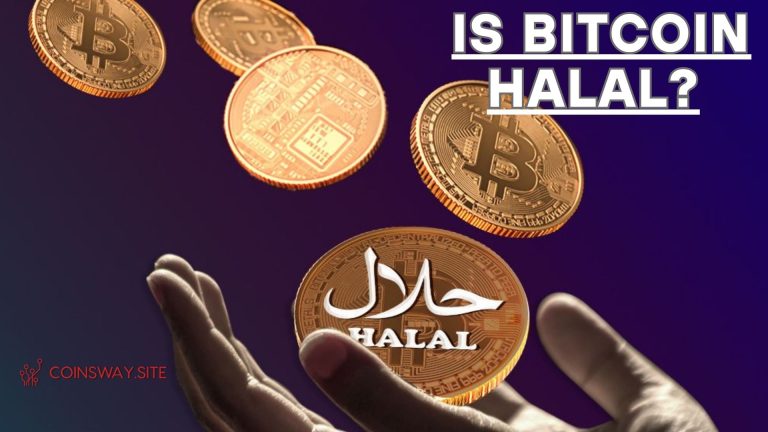Is Bitcoin Halal? Scholars, financial experts, and members of the Muslim community are actively debating whether Bitcoin is halal, or permissible, under Islam. Bitcoin’s Islamic rule is complicated because it is a relatively new technology that is very different from conventional currencies. While some academics are concerned, others consider it to be halal. How Bitcoin is utilised, how it is obtained, and whether it complies with Islamic finance rules will all influence the answer.
Understanding Bitcoin.
Blockchain is a decentralised network that powers the digital money Bitcoin. Bitcoin is not governed by a single entity, in contrast to fiat currency issued by governments. It can be used as an investment asset, to store value, or to purchase products and services.
Due to its finite quantity (there will only ever be 21 million coins), resistance to inflation, and capacity for quick, international payments, Bitcoin has become increasingly popular.
Islamic Finance Principles.
To understand whether Bitcoin is halal, we must compare it with the key principles of Islamic finance. Some of the most important principles include:
- Riba (Interest)—Earning or settling interest is strictly forbidden.
- Gharar (Uncertainty)—Excessive uncertainty or ambiguity in transactions is not allowed.
- Haram Activities—Investments or trades must not support businesses involving alcohol, gambling, pornography, or other haram activities.
- Real Economic Activity—Transactions must have real economic value and not be purely speculative or based on gambling (maysir).
- Ownership and Transparency—Assets must be tangible or clearly defined and traded with mutual consent.
Now, let’s examine Bitcoin in light of these principles.
Arguments in Favour of Bitcoin Being Halal.
1. Store of Value and Medium of Exchange
Bitcoin can be considered a form of money, just like gold or silver, which have historically been used in Islamic societies. It is a digital asset that can be exchanged for goods and services. Some Islamic scholars argue that if a community accepts Bitcoin as a valid medium of exchange, then it fulfils the role of money in Islam.
2. No Involvement of Riba
Bitcoin itself does not involve interest (riba). It is not based on debt, and holding Bitcoin does not earn interest by default. Unlike savings accounts in conventional banks, Bitcoin users do not receive or pay interest unless they engage with interest-based lending platforms, which can be avoided.
3. Decentralization and Transparency
The blockchain technology behind Bitcoin ensures a high level of transparency. Every transaction is recorded and viewable on the public ledger. There is no central control or manipulation, which aligns with the Islamic principle of fairness and openness in trade.
4. Voluntary Trade and Ownership
Bitcoin transactions are based on mutual agreement, and ownership is clearly defined by private keys. This supports the Islamic requirement of clarity and mutual consent in trade.
Concerns About Bitcoin’s Permissibility.
1. High Volatility and Speculation
One major concern is that Bitcoin is highly volatile. Its price can rise or fall dramatically within hours. This leads to speculative trading, which some scholars equate with gambling (maysir). Islam prohibits gambling and transactions based purely on speculation without real economic activity.
2. Use in Illegal or Haram Activities
Bitcoin is sometimes associated with dark web transactions, money laundering, and illegal activities. However, this is not unique to Bitcoin Cash, and other currencies can also be misused. Islam emphasises intention and context. Using Bitcoin for haram definitions would make the action haram, but not necessarily the asset itself.
3. Lack of Intrinsic Value
Some scholars argue that Bitcoin has no intrinsic value, unlike gold or real estate. They say it only has value because people believe in it, which makes it speculative. However, others argue that Bitcoin’s value comes from its utility, scarcity, and global acceptance—similar to how paper money works today.
Diverse Scholarly Opinions.
There is no unanimous agreement among Islamic scholars regarding Bitcoin. Some major fatwas and Islamic authorities have differing views:
- Mufti Muhammad Abu Bakar, a Shariah scholar from Blossom Finance (Indonesia), published a research paper concluding that Bitcoin is generally permissible.
- Egypt’s Dar al-Ifta (a leading Islamic power) declared Bitcoin haram due to its theoretical nature.
- Scholars in countries like Malaysia and Turkey have issued both permissive and restrictive opinions, depending on usage.
Conclusion.
The Islamic ruling on Bitcoin depends on how it is used. If Bitcoin is used ethically, for halal purposes, and not for gambling or fraud, many scholars consider it permissible (halal). However, if it is used for speculative day trading, interest-based lending, or illegal activity, then it would be haram based on usage.
For Muslims interested in Bitcoin, it is recommended to:
- Use it as a store of value or medium of exchange.
- Avoid platforms involving interest or excessive speculation.
- Ensure transparency and avoid haram transactions.
As with many emerging technologies, it’s best to seek guidance from a qualified Islamic scholar or financial advisor who understands both Shariah principles and cryptocurrency.


